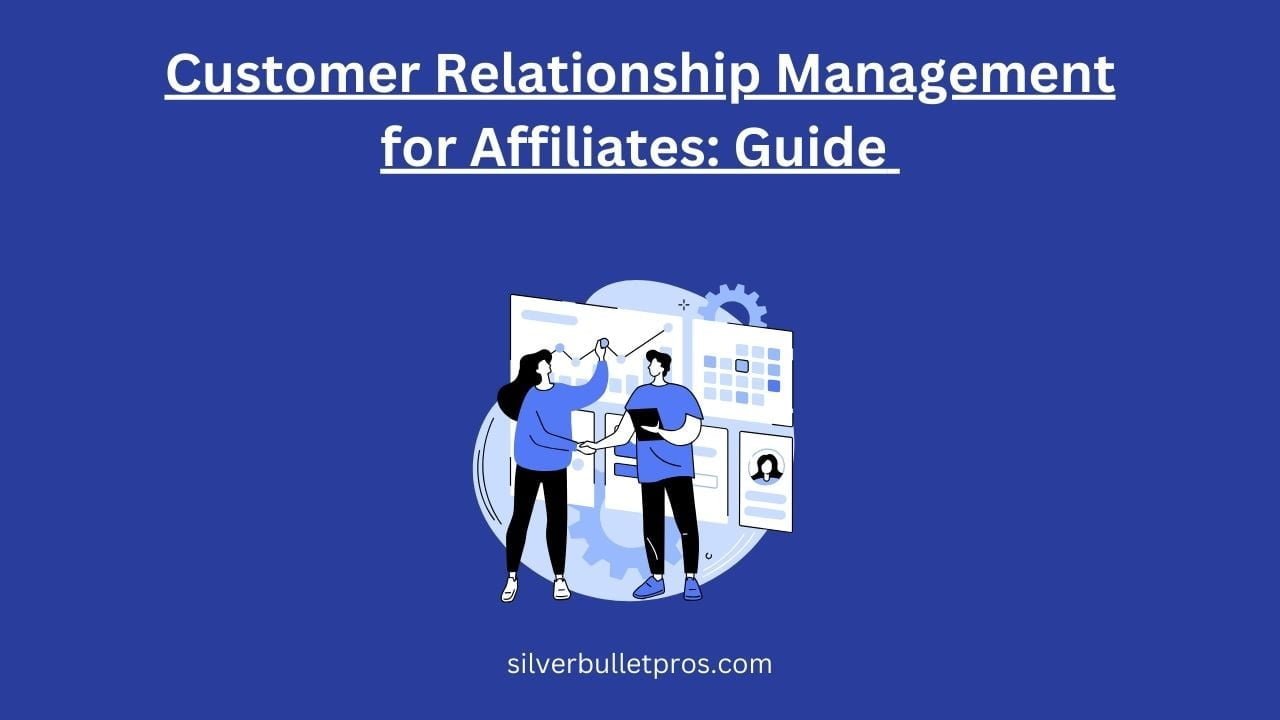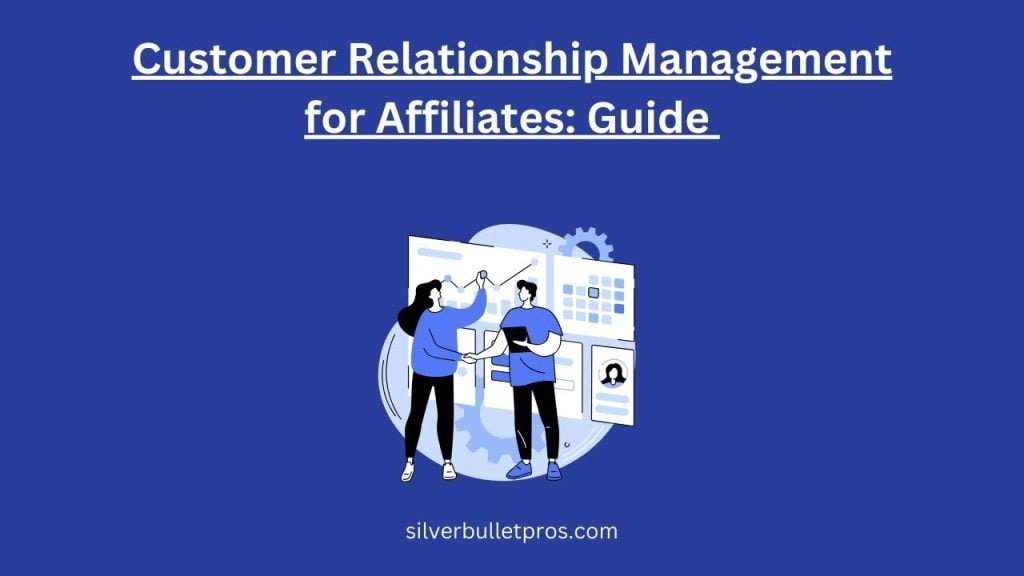

This comprehensive guide delves into the intricate world of customer relationship management (CRM) for affiliates. Effective CRM strategies empower affiliates to cultivate long-lasting bonds with customers, increase brand loyalty, and ultimately boost profitability. By mastering the art of CRM, affiliates can gain a competitive edge and thrive in the ever-evolving landscape of affiliate marketing.
1. Get an Affiliate Management Tool
The foundation of successful CRM for affiliates lies in adopting a robust affiliate management tool. According to a study by Forrester Research, businesses that utilize CRM tools experience an average 25% increase in revenue. These platforms streamline various aspects of affiliate marketing, including tracking campaigns, managing commissions, and analyzing performance metrics.
Example affiliate management tools:
- Post Affiliate Pro: Comprehensive solution for affiliate recruitment, payment processing, and real-time reporting.
- Tapfiliate: User-friendly platform with advanced features like multi-tier commissions and fraud protection.
2. Build Brand and Sell
To cultivate lasting customer relationships, affiliates must focus on building a strong brand identity. A study by Edelman revealed that 81% of consumers need to trust a brand before making a purchase. By consistently delivering high-quality content and exceptional customer service, affiliates can establish themselves as authoritative figures in their respective niches.
Moreover, effective storytelling and emotional connections are key to selling products or services. According to a NeuroInsights study, emotionally engaging content is more likely to influence consumer behavior and drive conversions.
3. Be Responsive
In today's fast-paced digital world, customers expect prompt and efficient communication. A survey by SuperOffice found that 90% of customers rate an immediate response as essential or very important when evaluating customer service.
Implement a robust system for handling customer inquiries, complaints, and feedback. Respond promptly to emails, social media mentions, and comments, fostering an environment of open communication and trust.
4. Have Transparent Policies
Transparency is crucial in building strong customer relationships. According to a Label Insight study, 94% of consumers are likely to remain loyal to a brand that offers complete transparency.
Clearly outline your affiliate program's policies, including commission structures, cookie durations, and terms of service. Keep customers informed about any changes or updates to ensure they feel valued and respected.
5. Consider Incentives
Offering incentives can be an effective way to enhance customer loyalty and drive engagement. A study by the Incentive Research Foundation found that 65% of consumers are more likely to make a purchase when incentives are involved.
Implement rewards programs, exclusive discounts, or loyalty points to incentivize customers to interact with your brand and make repeat purchases. However, ensure that incentives are tailored to your target audience's preferences and are valuable to them.
6. Use Technology to Automate Processes
Embracing technology can streamline CRM processes and enhance the customer experience. A report by Salesforce revealed that 77% of service agents believe AI and automation improve their ability to provide excellent customer service.
Utilize tools like chatbots, automated email sequences, and personalized recommendations to provide seamless and efficient support. However, strike a balance between automation and human interaction to maintain a personalized touch.
7. Map Affiliate Journey
Understanding the customer journey is essential for delivering personalized experiences and fostering long-term relationships. According to a study by Gartner, 89% of companies compete primarily on customer experience.
Map the affiliate journey from initial awareness to post-purchase engagement, identifying touchpoints and opportunities for interaction. Tailor your CRM strategies to address specific needs and pain points at each stage, ensuring a cohesive and memorable experience.
8. Quality of Content
Content is the cornerstone of building trust and establishing authority in the affiliate marketing realm. A study by BrightEdge found that 53% of website traffic comes from organic search, emphasizing the importance of high-quality, SEO-optimized content.
Create valuable, informative, and engaging content that resonates with your target audience. Regularly update your content to ensure relevance and accuracy, positioning yourself as a trusted source of information.
9. Proper Communication
Effective communication is vital for building strong customer relationships. According to a study by RightNow Technologies, 73% of consumers prefer to do business with brands that provide consistent information across all channels.
Develop a consistent brand voice and messaging across all communication channels, including social media, email, and customer support. Ensure that your messaging aligns with your brand values and resonates with your target audience.
10. Be Active on Marketing Channels
In today's digital landscape, customers expect brands to have an active presence on various marketing channels. A study by Sprout Social revealed that 64% of consumers expect companies to respond to inquiries within an hour on social media.
Maintain an active presence on relevant social media platforms, engaging with your audience, responding to comments and messages, and sharing valuable content. Additionally, leverage email marketing and other channels to keep customers informed and engaged.
11. Monitor Application
Continuously monitoring and analyzing the performance of your CRM efforts is crucial for identifying areas for improvement and making data-driven decisions. According to a study by Aberdeen Group, companies that analyze customer data outperform competitors by 85% in sales growth.
Regularly track key metrics, such as customer acquisition rates, retention rates, and customer lifetime value. Utilize analytics tools and dashboards to gain insights into customer behavior and preferences, allowing you to refine your CRM strategies accordingly.
How to Scale
As your affiliate business grows, it's essential to scale your CRM efforts effectively. A study by Bain & Company found that 80% of companies believe they deliver a superior customer experience, while only 8% of customers agree.
To scale successfully, consider the following strategies:
- Automate Processes: Implement automation tools and workflows to streamline repetitive tasks, such as email campaigns and data entry, freeing up resources for more personalized interactions.
- Leverage Data Analytics: Utilize advanced data analytics and machine learning to gain deeper insights into customer behavior, preferences, and pain points, enabling more targeted and personalized CRM strategies.
- Outsource Non-Core Functions: Consider outsourcing non-core functions, such as customer support or data entry, to specialized third-party providers, allowing you to focus on core CRM activities.
- Invest in Employee Training: Provide ongoing training and development opportunities for your team to ensure they have the necessary skills and knowledge to deliver exceptional customer experiences as your business scales.
By implementing scalable CRM strategies, you can maintain a high level of customer satisfaction and loyalty, even as your affiliate business expands.
Software to Automate Processes
To streamline your CRM efforts and maximize efficiency, consider leveraging the following software solutions:
- Customer Relationship Management (CRM) Software: Tools like HubSpot, Salesforce, and Zoho CRM offer comprehensive solutions for managing customer interactions, tracking leads, and analyzing data.
- Marketing Automation Software: Platforms like ActiveCampaign, Marketo, and Pardot help automate email marketing campaigns, lead nurturing, and customer segmentation.
- Live Chat and Chatbot Software: Solutions like Intercom, Drift, and Freshchat enable real-time customer support and personalized conversations through live chat and AI-powered chatbots.
- Social Media Management Tools: Tools like Hootsuite, Sprout Social, and Buffer help you manage and monitor your social media presence, engage with customers, and analyze social media metrics.
By leveraging these software solutions, you can automate various aspects of your CRM processes, freeing up time and resources to focus on delivering exceptional customer experiences.
What to Ask from an Affiliate
To build a successful affiliate program and foster strong customer relationships, it's essential to establish clear expectations and guidelines for your affiliates. Here are some key questions to ask:
- What is your target audience and marketing strategy? Understanding your affiliates' target audience and marketing approach will help you ensure alignment with your brand and provide relevant support.
- How do you plan to promote our products or services? Gain insights into the specific channels and tactics your affiliates will use to promote your offerings, allowing you to provide tailored guidance and resources.
What are the key benefits of implementing a CRM system for affiliate marketing?
A CRM system can help centralize affiliate data, automate communication, track performance metrics, and streamline commission payouts, leading to better affiliate relationships and program management.
How can a CRM tool help streamline communication and tracking with multiple affiliates?
CRM tools allow for personalized communication, automated updates, and comprehensive tracking of affiliate activities, leads, and conversions from a single platform, simplifying management across multiple affiliates.
What are some essential features to look for in a CRM solution tailored for affiliate programs?
Key features include affiliate onboarding and management, commission tracking, performance reporting, marketing campaign management, and integration with payment gateways and affiliate networks.
How can CRM data and analytics help optimize affiliate recruitment and management strategies?
CRM data and analytics can provide insights into top-performing affiliates, effective marketing channels, and conversion rates, enabling data-driven decisions for recruiting new affiliates and optimizing existing partnerships.
What are the common challenges in adopting a CRM for affiliate marketing, and how can they be addressed?
Common challenges include data migration, user adoption, and customization needs. Addressing these through proper planning, training, and selecting a flexible CRM solution can help ensure a smooth transition and effective implementation.